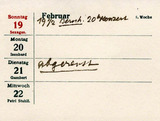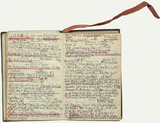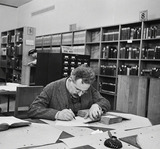Margarete Steffin: diary entry regarding Brecht’s Galileo (27 to 29 March 1939)
Margarete Steffin: diary entry regarding Brecht’s Galileo (27 to 29 March 1939)
Außerdem ist sie Mitarbeiterin bei „Furcht und Elend“, „Galilei“ und „Mutter Courage“ und genauso kannst Du sagen, dass sie bei den theoretischen Arbeiten mitgearbeitet hat.
[What’s more she is a collaborator on “Fear and Misery”, “Galileo” and “Mother Courage” and you could just as well say that she collaborated on the theoretical work as well. (ed. trans.)]
Bertolt Brecht to Erwin Piscator on 27 May 1940
Bertolt Brecht wrote his first pieces in exile in Denmark, Sweden and Finland. In 1939 there was no chance of having them printed. Working in the distant north of Europe, he relied on friends in France, Switzerland and the USA who acted as sounding boards, providing connections to theatres and magazines, offering opinions, suggesting cuts and thinking about productions. They formed his exile network in 1939.
Brecht worked on his drama Life of Galileo in Skovsbostrand, near Svendborg between spring 1938 and February 1939; it examined the Italian physicist Galileo Galilei who discovered that the Earth revolves around the Sun, and who was called to the Inquisition to either assert or contest this insight.
Margarete Steffin was Brecht’s most important collaborator in Scandinavian exile. Together with Helene Weigel she had put together a limited run of hectograph copies of Galileo. In her pocket diary, an English Marquette Senior model, she recorded the names of 23 recipients who were to receive one manuscript each between 27 and 29 March 1939. There were 13 recipients in the USA, one in Sweden, seven in France, two in Switzerland. The first name on the list was Albert Einstein, then the names of writers, musicians, directors and actors of Brecht’s acquaintance, including Lion Feuchtwanger, Walter Benjamin, Erwin Piscator, Alexander Granach and Hanns Eisler. The last copy went to the Schauspielhaus Zürich, where Galileo had its premiere on 9 September 1943.





